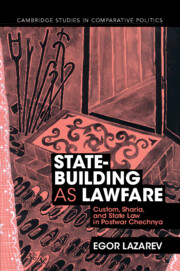Book contents
- State-Building as Lawfare
- Cambridge Studies in Comparative Politics
- State-Building as Lawfare
- Copyright page
- Dedication
- Contents
- Figures and Tables
- Acknowledgments
- Introduction
- Part I Theory and Ethnography
- Part II Lawfare and Political Order
- Part III Lawfare and Social Order
- 6 Laws in Conflict?
- 7 “People Need Law”
- 8 Chechen Women Go to Court
- Conclusion
- References
- Index
- Other Books in the Series (continued from page ii)
7 - “People Need Law”
Demand for Social Order after Conflict
from Part III - Lawfare and Social Order
Published online by Cambridge University Press: 02 February 2023
- State-Building as Lawfare
- Cambridge Studies in Comparative Politics
- State-Building as Lawfare
- Copyright page
- Dedication
- Contents
- Figures and Tables
- Acknowledgments
- Introduction
- Part I Theory and Ethnography
- Part II Lawfare and Political Order
- Part III Lawfare and Social Order
- 6 Laws in Conflict?
- 7 “People Need Law”
- 8 Chechen Women Go to Court
- Conclusion
- References
- Index
- Other Books in the Series (continued from page ii)
Summary
This chapter presents an analysis of the legacies of armed conflict in legal preferences and behavior at the individual, community, and societal levels. After a brief description of civilian experiences of conflict, the chapter reports a surprising finding: the indicators of individual-level victimization that have been used in numerous recent studies on the consequences of conflict were found to be poor predictors of legal choices in Chechnya. The analysis proceeds at the community level and uncovers the fact that while collective violence during the First War led to alienation from Russia, the Second War led to an increased demand for state law. The Second War was more brutal, longer, and characterized by massive inter-Chechen violence. As a result, it diminished the role of elders and extended families, led to mass migration, and weakened the legitimacy of Sharia, which was associated with the Islamist rebels. These patterns are illustrated with case studies of three communities: one that is emblematic of civilian suffering during the First War, another that underwent sustained collective violence during the Second War, and a third community that largely avoided victimization. Finally, the chapter analyzes the macro-level effects of conflict by comparing legal preferences in Chechnya with those in the neighboring region of Ingushetia.
- Type
- Chapter
- Information
- State-Building as LawfareCustom, Sharia, and State Law in Postwar Chechnya, pp. 209 - 237Publisher: Cambridge University PressPrint publication year: 2023



